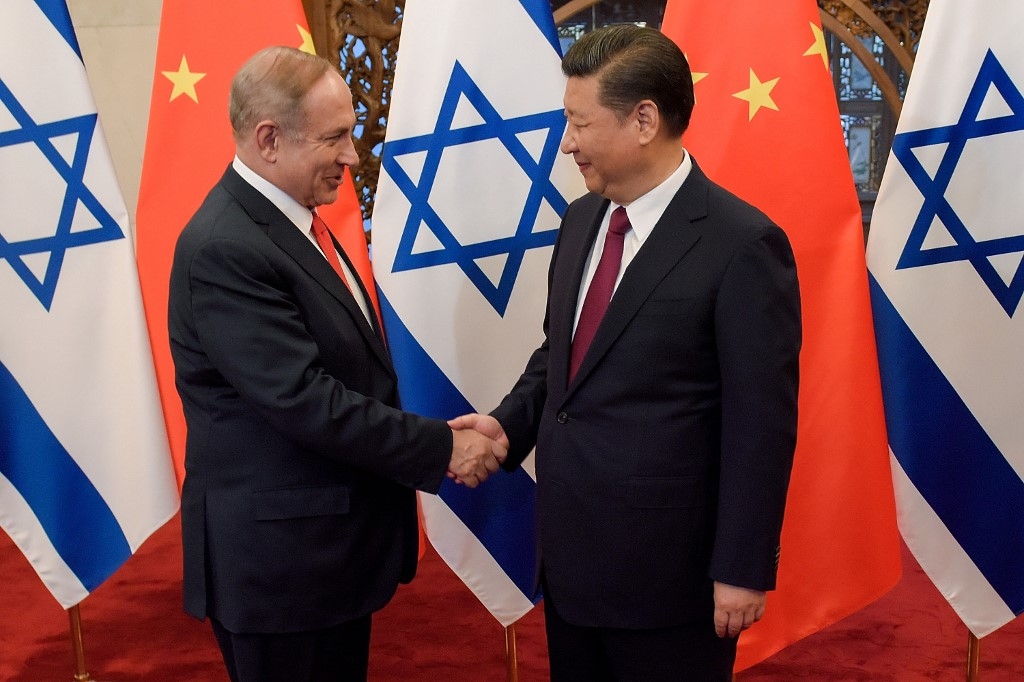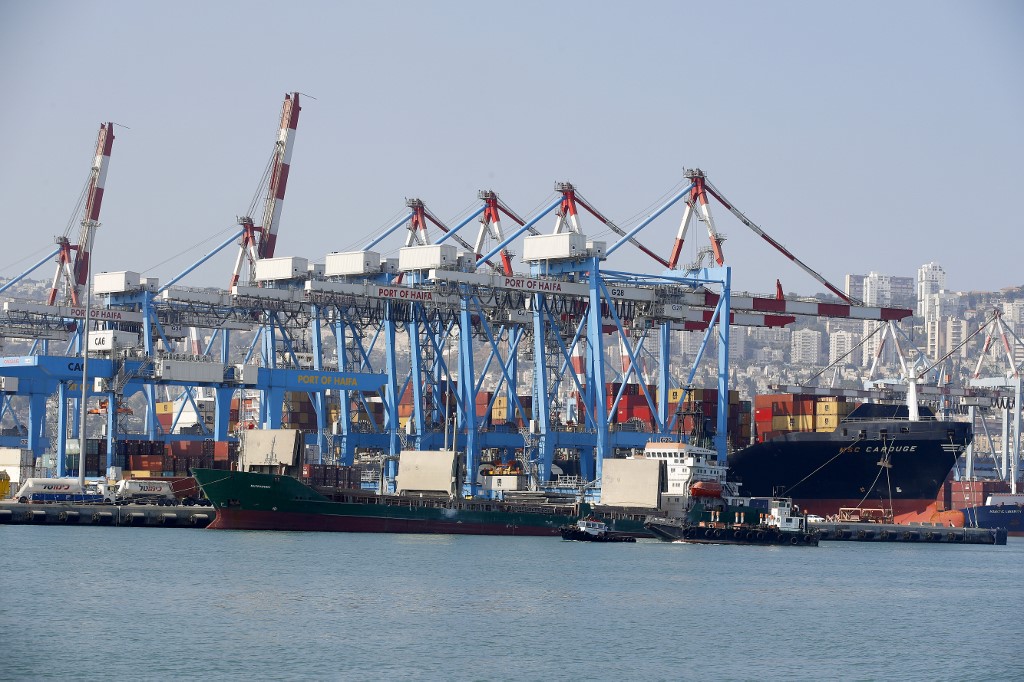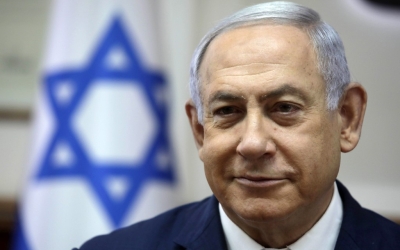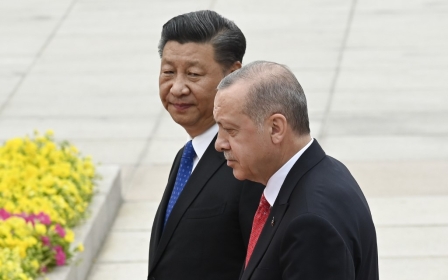US-China rivalry comes to Israel

China's approach to the Middle East region is inclusive, as it tries to maintain ties with all states, even those on opposing sides of major disputes like Saudi Arabia and Iran.
China also deals with Israel and the Palestinians, attempting to mediate between them.
In the late 1970s, Sino-Israeli relations began to thaw with a series of arms deals. The two countries launched formal diplomatic relations in 1992. However, they soon encountered resistance from Washington, which objected to Sino-Israeli arms transfers. By the mid-2000s, military ties had flatlined, and the relationship focused more on economic cooperation.
Commerce quickly increased, as tensions between Israeli Prime Minister Benjamin Netanyahu and former US President Barack Obama, combined with the rise of the boycott, divestment and sanctions (BDS) movement and economic stagnation in Europe, led Israel to look east.
In 2013, Netanyahu paid a state visit to China. Two years later, Israel joined the Chinese-led Asian Infrastructure Investment Bank, against US wishes. And in 2017, Netanyahu signed 10 agreements in Beijing.
New MEE newsletter: Jerusalem Dispatch
Sign up to get the latest insights and analysis on Israel-Palestine, alongside Turkey Unpacked and other MEE newsletters
While Washington appears to be making some headway in getting Israel to play ball, it will not be able to significantly reduce Sino-Israeli ties
But Israel is now under pressure to change course. US President Donald Trump has taken a much tougher line against Beijing than his predecessor, and the coronavirus pandemic has exacerbated an already strained US-China relationship.
As part of its anti-China push, Washington is leaning heavily on its partners to minimise their ties to Beijing. Israel is no exception. In May, US Secretary of State Mike Pompeo visited Jerusalem to discuss China and other issues with Netanyahu’s new government.
Israel seemed to cave to US pressure when, soon after Pompeo’s trip, it did not award the contract for a desalination plant to a Hong Kong-based company, preferring a domestic firm.
While the decision was apparently made based on cost, Israel would likely have blocked the Chinese bid, anyway, to appease the US, according to RAND Corporation expert Shira Efron.
It also looks like China's tech giant, Huawei, is being left out of Israel’s 5G network tender. And a consortium that included a Chinese company recently lost the bid for a new power plant.
Growing trade
While Washington appears to be making some headway in Israel, it will struggle to seriously undermine the Sino-Israeli relationship, which is substantial and multifaceted.
Trade has risen dramatically, with a fourfold increase in Israel’s exports to China between 2008 and 2018, making Beijing its second-largest trading partner. The two sides have been negotiating a free trade agreement, with a decision expected this year.
There are also academic exchanges, with more Chinese students coming to Israel. Tsinghua University and Tel Aviv University have partnered to set up a research centre. Israel’s Technion Institute of Technology has set up a branch in China’s Guangdong province.
Chinese tourism to Israel has also boomed, with more than 100,000 tourists visiting in 2017. There are also soft power initiatives, such as the founding of Confucius Institutes, which give classes in Chinese language and culture.
These efforts have clearly paid off. According to 2019 polling data, 66 percent of the Israeli public has a favourable view of China, among the highest ratings. In the US, by contrast, the figure is only 26 percent.
Infrastructure projects
Chinese companies are also involved in infrastructure projects in Israel. Beijing seemingly wants to incorporate Israel into its Belt and Road Initiative (BRI), a global nexus of land and maritime trade routes inaugurated in 2013.
Five years ago, Shanghai International Port Group won a contract to operate the Haifa container port, starting in 2021. Another Chinese company won a bid to run the Ashdod port.
These contracts are controversial. The Haifa terminal is next to an Israeli naval base, where the US Sixth Fleet frequently docks. A Chinese presence nearby could possibly expose US and Israeli military assets to surveillance and monitoring.
Chinese firms have also been involved in tunnel projects and the Tel Aviv light railway. But Israel is problematic as a BRI partner country. It has poor relations with most of its neighbours, limiting the potential for connectivity through the initiative’s overland routes.
However, one project that might slot into the BRI is a prospective “Red-Med” rail link connecting Ashdod with the port of Eilat on the Red Sea. This would give China further access to the Mediterranean, lessening its dependence on the Suez Canal.
'Silicon Wadi'
On the technology front, Chinese companies such as Alibaba, Tencent and Baidu are investing in Israel’s “Silicon Wadi”, part of a push by the Beijing government to turn China into a technology superpower under its Made in China 2025 initiative.
From 2015-2016, Chinese technology investment in Israel rose tenfold. In 2017, Alibaba launched a research hub in Tel Aviv, and there is an innovation partnership involving high-level government officials on both sides.
It is also feared that Chinese investment in the technology sector could expose Israel and the US to hacking and cyberespionage
But there are concerns that many of the Chinese firms involved in Israel are close to the government. The tech giant ZTE, for instance, is investing in Israel and has links to Beijing. To make matters worse, ZTE has worked with Israel’s archenemy, Iran.
China could use these investments to transfer dual-use Israeli and US technology that could be used in military applications, including artificial intelligence, semiconductor, satellite and robotics technology.
It is also feared that Chinese investment in the technology sector could expose Israel and the US to hacking and cyberespionage. User data might be transferred to China and accessed by the government.
To assuage concerns about China’s role, Israel has introduced a foreign investment screening board to assess risks. But the committee does not yet cover the technology sector and requires further development.
UN voting record
Despite China’s growing influence, Israel is still heavily reliant on the US as its principal security provider and economic partner. Added to that, Washington consistently supports Israel at the UN.
China, by contrast, usually votes against Israel, recently opposing the move to make Jerusalem the new capital, for example. Israel, for its part, has not criticised Chinese policies in Hong Kong and Xinjiang, and feels slighted by China’s UN record.
Despite growing US pressure, it is unlikely that Israel will greatly reduce its China ties. The Israeli economy is projected to contract this year, while China’s will likely grow. In the current global economic slowdown, it would be suicidal to cut off trade and investment.
Furthermore, if Joe Biden wins the 2020 presidential election, US-Israel ties could deteriorate. Biden served in the Obama administration, which had poor relations with Netanyahu. Israel might need to rely more on China.
Although the Trump administration is very pro-Israel, public opinion in the West is not. Given these trends, it makes sense for Israel to balance its traditional Western partners with new friends in Asia.
Disastrous alternative
China also has a permanent seat at the UN Security Council and could become a useful ally if it changed its voting habits. India, another country courted by Netanyahu, has already started to support Israel at the UN.
While Beijing has criticised Israel's plans to annex parts of the West Bank, European countries have been more outspoken, threatening sanctions. Annexation could undermine Israel's ties to the West and drive it further into China's orbit.
Beijing has been close to Israel's nemesis, Iran, but the Sino-Iranian relationship is weakening amid US sanctions, with trade falling precipitously. Israel increasingly looks like a more rewarding partner.
The superpower rivalry now playing out in Israel looks set to intensify. Both Trump and Biden are running on an anti-China platform. Whoever wins will likely continue to push back against Beijing’s influence.
But there are limits to what can be achieved. Eventually, the US and China will have to settle their differences and learn to coexist. The alternative could be too disastrous to contemplate.
The views expressed in this article belong to the author and do not necessarily reflect the editorial policy of Middle East Eye.
Middle East Eye delivers independent and unrivalled coverage and analysis of the Middle East, North Africa and beyond. To learn more about republishing this content and the associated fees, please fill out this form. More about MEE can be found here.








